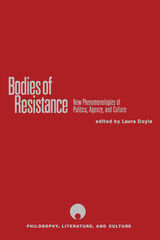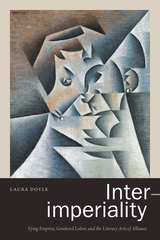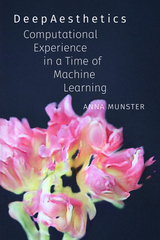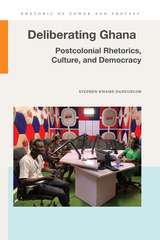3 books about Doyle, Laura

Bodies of Resistance
New Phenomenologies of Politics, Agency, and Culture
Laura Doyle
Northwestern University Press, 2001
This startling volume explores the traumas and possibilities of embodiment as it is lived in a political world. Unveiling the influence of phenomenology, particularly that of Maurice Merleau-Ponty, on contemporary thought. Bodies of Resistance cuts across the disciplines of philosophy, political theory, literature, and cultural studies to explore anew how we are at once produced by yet resistant to cultural norms.
[more]

Freedom's Empire
Race and the Rise of the Novel in Atlantic Modernity, 1640-1940
Laura Doyle
Duke University Press, 2007
In this pathbreaking work of scholarship, Laura Doyle reveals the central, formative role of race in the development of a transnational, English-language literature over three centuries. Identifying a recurring freedom plot organized around an Atlantic Ocean crossing, Doyle shows how this plot structures the texts of both African-Atlantic and Anglo-Atlantic writers and how it takes shape by way of submerged intertextual exchanges between the two traditions. For Anglo-Atlantic writers, Doyle locates the origins of this narrative in the seventeenth century. She argues that members of Parliament, religious refugees, and new Atlantic merchants together generated a racial rhetoric by which the English fashioned themselves as a “native,” “freedom-loving,” “Anglo-Saxon” people struggling against a tyrannical foreign king. Stories of a near ruinous yet triumphant Atlantic passage to freedom came to provide the narrative expression of this heroic Anglo-Saxon identity—in novels, memoirs, pamphlets, and national histories. At the same time, as Doyle traces through figures such as Friday in Robinson Crusoe, and through gothic and seduction narratives of ruin and captivity, these texts covertly register, distort, or appropriate the black Atlantic experience. African-Atlantic authors seize back the freedom plot, placing their agency at the origin of both their own and whites’ survival on the Atlantic. They also shrewdly expose the ways that their narratives have been “framed” by the Anglo-Atlantic tradition, even though their labor has provided the enabling condition for that tradition.
Doyle brings together authors often separated by nation, race, and period, including Aphra Behn, Eliza Haywood, Olaudah Equiano, Nathaniel Hawthorne, Harriet Wilson, Pauline Hopkins, George Eliot, and Nella Larsen. In so doing, she reassesses the strategies of early women novelists, reinterprets the significance of rape and incest in the novel, and measures the power of race in the modern English-language imagination.
[more]

Inter-imperiality
Vying Empires, Gendered Labor, and the Literary Arts of Alliance
Laura Doyle
Duke University Press, 2020
In Inter-imperiality Laura Doyle theorizes the co-emergence of empires, institutions, language regimes, stratified economies, and literary cultures over the longue durée. Weaving together feminist, decolonial, and dialectical theory, she shows how inter-imperial competition has generated a systemic stratification of gendered, racialized labor, while literary and other arts have helped both to constitute and to challenge this world order. To study literature is therefore, Doyle argues, to attend to world-historical processes of imaginative and material co-formation as they have unfolded through successive eras of vying empires. It is also to understand oral, performed, and written literatures as power-transforming resources for the present and future. To make this case, Doyle analyzes imperial-economic processes across centuries and continents in tandem with inter-imperially entangled literatures, from A Thousand and One Nights to recent Caribbean fiction. Her trenchant interdisciplinary method reveals the structural centrality of imaginative literature in the politics and possibilities of earthly life.
[more]
READERS
Browse our collection.
PUBLISHERS
See BiblioVault's publisher services.
STUDENT SERVICES
Files for college accessibility offices.
UChicago Accessibility Resources
home | accessibility | search | about | contact us
BiblioVault ® 2001 - 2025
The University of Chicago Press









